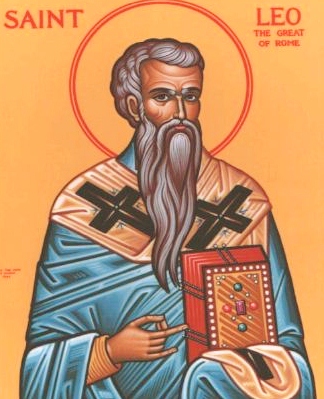For this week, read through St. Leo’s Christmas Sermon 21. Read it slowly and allow it to give you a deeper and richer understanding of what we celebrate at Christmas. As you read through the sermon see how Leo applies to the Nativity the same gospel themes that we see throughout the New Testament and particularly in Paul’s letters.
Section 1 – We all share in the Christmas joy
In the first section, St. Leo tells us that Christmas is a time for joy because our redemption is at hand. We are obtaining eternal life and our fear of death had died; therefore, we must rejoice. This joy is not limited to only good Christians but is open to all. All have sinned, and therefore, Christ comes for all. The saints are joyful because they know that God’s victory is at hand. The sinners are joyful because their full pardon is given. Even those outside of the church are joyful because Christ calls to them as well.
The Incarnation is the means of our redemption. We are made in God’s image, but in the Fall, which was engineered by the devil, that image becomes deformed. The deformed image brings death. In the Incarnation, God unites himself to our nature, thereby restoring that image. For Leo, as for most of the ancient church, salvation is not an individualized activity. The redemption worked by the Incarnation is not on an individualized level but on the metalevel of that human nature common to all humanity.
Although God presumably could have chosen another means to free us from bondage, God takes our form and our nature to do battle with the devil, for that is only fair. The devil caused the first person to sin, and therefore a person needs to fight back and take back humanity’s humanity. It is God, in our form, who fights and conquers the devil who has fought and conquered us.
The first to know of this great event is Mary. (You cannot have a Christmas sermon without Mary.) Mary, who with great joy and faith, becomes the instrument that brings about humanity’s redemption. Mary’s faith and humility are an example for us. At this time of Christmas, we should be like Mary for the cosmos is pregnant with our salvation.
Section 2 – The Mystery of the Incarnation
Although the fullness of the Incarnation exceeds our capacity of understanding, nonetheless the basics of the Incarnation are essential to our understanding of the Gospel. St. Leo tells us that the Word of God, the Son of God, takes on the humility of human nature without any decrease in the majesty of the divine nature. Both natures are joined in the one person of Jesus without the exclusion of or loss of the other. He is fully God and fully Human. Majesty/humility, strength/weakness, eternity/mortality, and beatific/passible are joined together. This joining together of the divine and human is necessary to pay off the debt to the devil that belongs to our human nature. Looking ahead to the end of the story, St. Leo says that Jesus will die as a Human but rise as God.
St. Leo emphasizes the importance of the Incarnation. Unless Jesus was very God he could not bring the remedy for our fallen nature, but unless he was fully Human he could not give us an example to follow. Only in the Incarnation is there true freedom for us. Therefore, at this time of Christmas, we are called to join our voices with the angels singing “Glory to God in the Highest.”
Section 3 – Live a life worthy of Christ
St. Leo concludes his sermon with an exhortation to a holy life. As Paul himself repeatedly emphasizes, if we have been saved from the power of sin and darkness then our lives should reflect this. We should live into the dignity that rightly belongs to the divine image that has been restored in us. We should forsake the works of the flesh and bear the fruit of the Spirit. Holy living is not a condition precedent to salvation – we cannot earn that which was freely given to all in the Incarnation – but holy living is a sign of our rejoicing. Christ has ransomed us from the devil with his own blood shed on the Cross, therefore, we should not seek to return to the bondage of sin and death.
Since therefore the children share in flesh and blood, he himself likewise partook of the same nature, that through death he might destroy him who has the power of death, that is, the devil, and deliver all those who through fear of death were subject to lifelong bondage.
Hebrews 2:14-15

